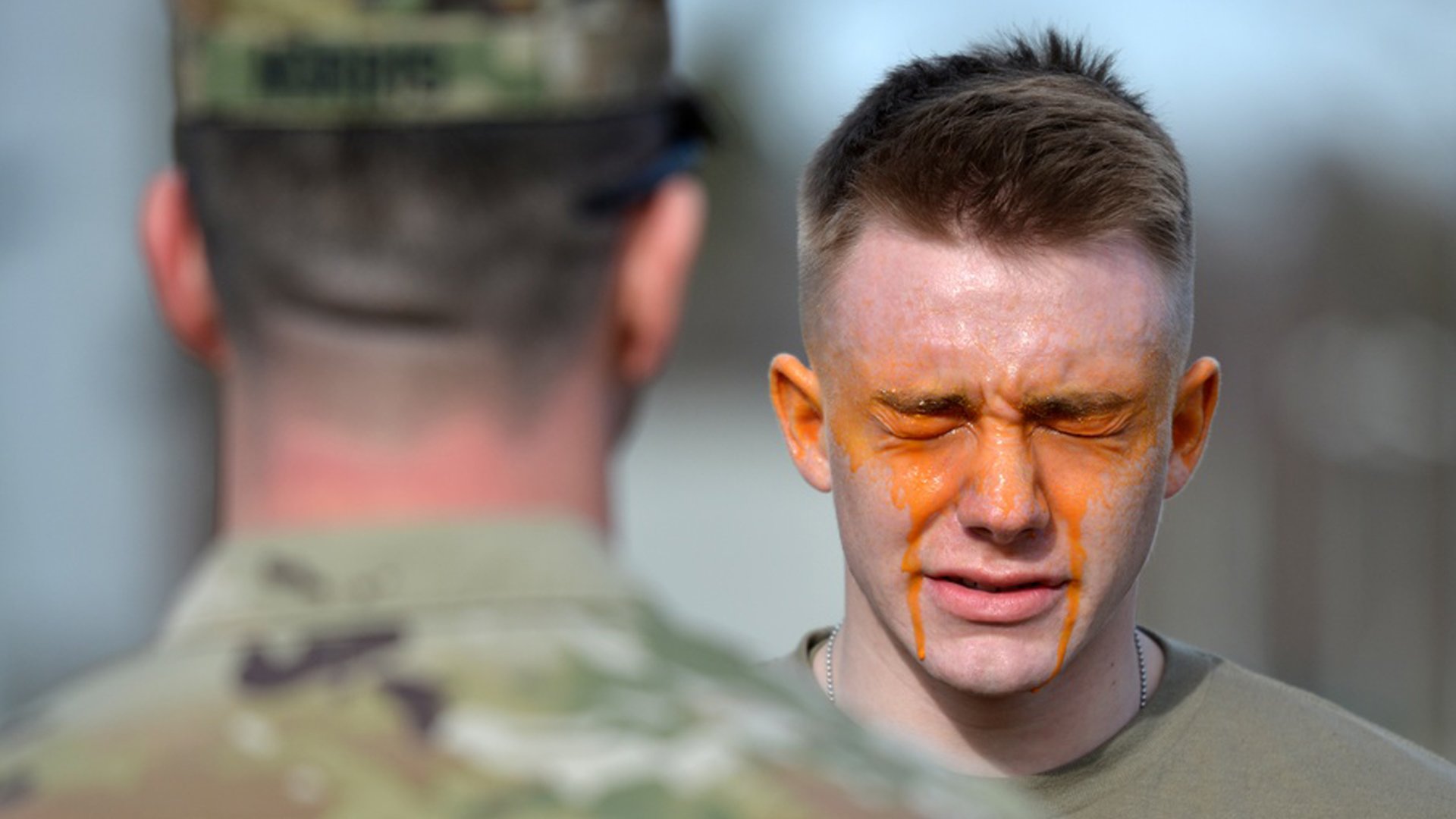
A U.S. Soldier assigned to 554th Military Police Company is sprayed with Oleoresin Capsicum (OC) Spray, more commonly known as "Pepper Spray," during a weapons qualification exercise held on Panzer Kaserne, Boeblingen, Germany, 08 February 2019. U.S. Army photo by Visual Information Specialist Jason D. Johnston.
As I closed my eyes and took a final lungful of air before the police academy instructor sprayed Red Sabre Max pepper spray directly into my face, I convinced myself it wouldn’t be so bad. After all, I’d had to endure the gas chamber every year while I was in the Marine Corps, and unlike CS gas, the pepper spray would be confined to just my face. Easy day, right? Several seconds passed after the nonlethal droplets showered my face, and the pepper spray felt no different than being misted with lavender Febreze. But when the instructor told me to open my eyes, things took an abrupt turn toward the horrible.
Immediately, it felt like a thousand needles had been jammed through my irises, fighting to burrow all the way to my brain. The pain got worse. Soon I found myself doubled over a garden hose, trying desperately to rid my face of the invisible fire. As I began to accept the fact that the pain wasn’t going anywhere anytime soon, I thought to myself, “This isn’t just worse than the gas chamber. It’s way fucking worse.”
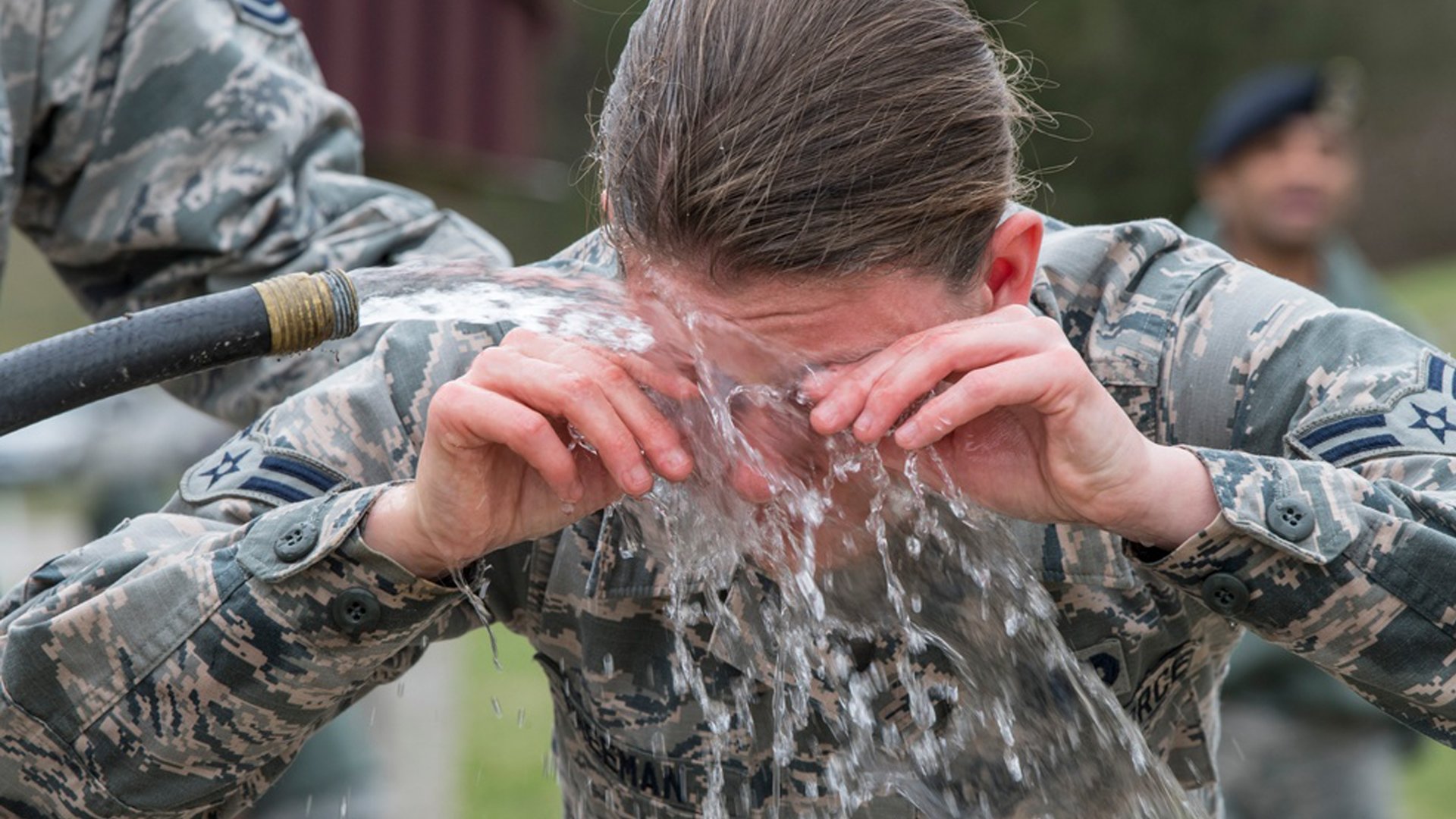
Airman 1st Class Kameron Freeman drains her eyes after being pepper sprayed, March 4, 2017, at McLaughlin Air National Guard Base, W.Va. Security Forces members are required to be pepper sprayed and put through a training course to deal with its effects. Freeman is assigned to the 130th Airlift Wing Security Forces Squadron. U.S. Air National Guard photo by Tech. Sgt. De-Juan Haley.
The gas chamber is often the event recruits dread most going into military basic training. They’ve heard horror stories of choking on the putrid air and long ropes of snot stretching from their noses down to their boots, but there’s really no way to understand how it feels unless you’ve fought to breathe in that toxic air. Similarly, there’s really no way to fully grasp the pain caused by a direct blast of pepper spray until you’ve been lucky enough to experience it.
The chemical used to turn an empty gas chamber into a foggy nightmare is 2-chlorobenzalmalononitrile, or simply CS. First developed in the United States in 1928 by scientists Ben Corson and Roger Stoughton as a nonlethal alternative to some of the chemical weapons engineered during World War I, CS is now widely used to disperse crowds. The synthetic irritant reacts with moisture, causing a burning sensation in the eyes, coughing, excess mucus discharge, and difficulty breathing. It can even cause vomiting, dizziness, and disorientation. Brooks Bojanowski — a former US Army counterintelligence agent — described his first experience in the gas chamber like this:
“There was a strong burning in my eyes and snot just dumped out of my nose. It was really hard to breathe, but that was mostly from laughing at the idiots who tried to sprint out of the chamber as soon as their masks came off.”
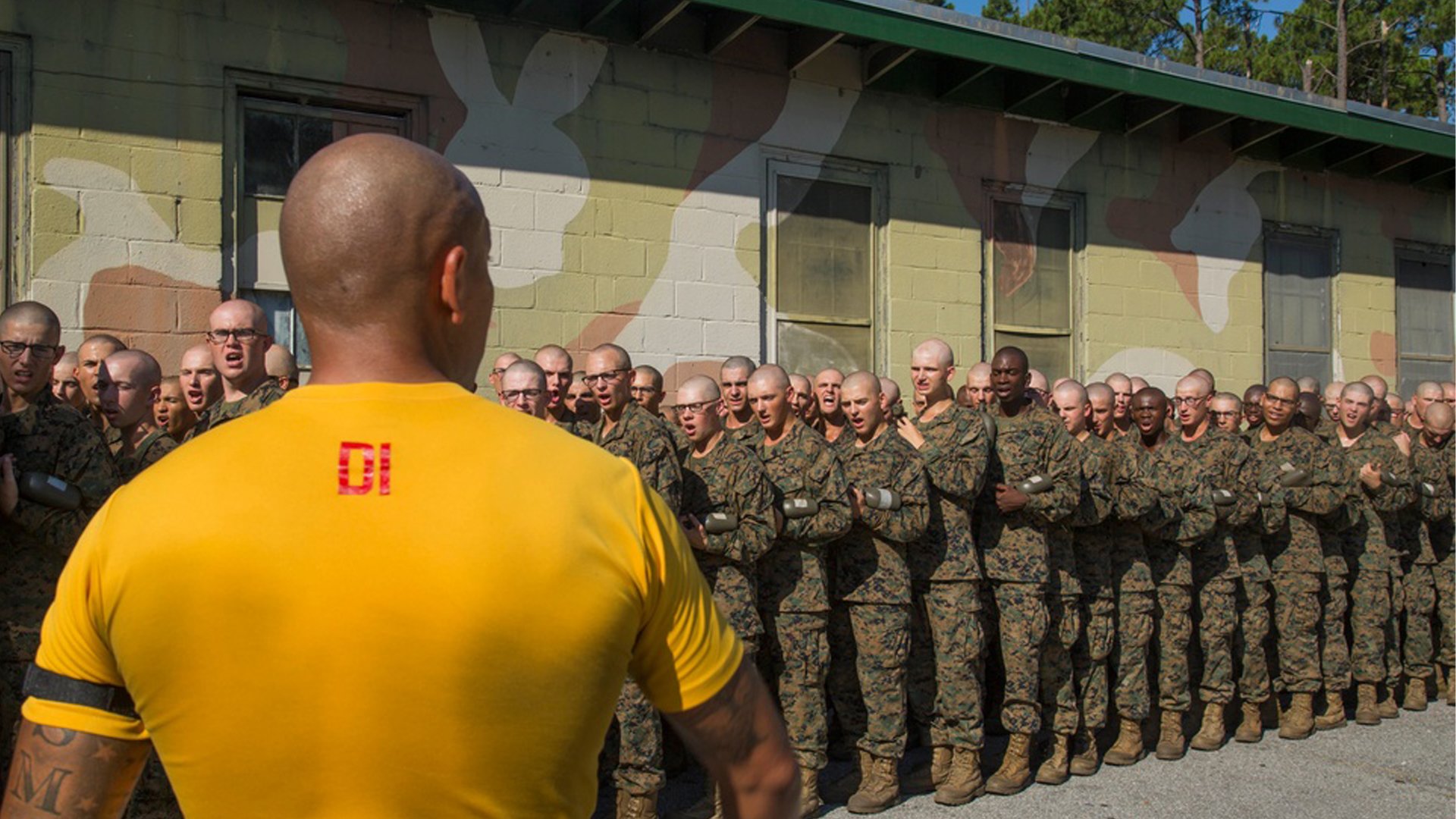
U.S. Marine Corps Recruits with Company F., 2nd Recruit Training Battalion, Recruit Training Regiment, wait for a chemical, biological, radiological and nuclear defense (CBRN) safety brief on Parris Island, S.C., July 26, 2016. Training for CBRN defense is an event that recruits must complete in order to become a United States Marine. U.S. Marine Corps photo by Lance Cpl. Mackenzie Carter.
Pepper spray, which gets its bite from oleoresin capsicum — an oil taken from the placenta of peppers — has similar effects. While it doesn’t directly affect breathing, it has a more immediate impact on the eyes.
“It feels like you’ve just had the world’s hottest pepper placed on your eyes,” Sgt. 1st Class Joseph Gonzales, former US Army nonlethal-weapons instructor, told Coffee or Die. “They instantly slam shut, tears start uncontrollably streaming, and snot pours out of your nose like a waterfall. No matter how badly you want to open your eyes, your body refuses, and they slam shut again.”
Tyler Newberry, a police officer with the Baltimore County Police Department, told Coffee or Die the feeling of getting pepper-sprayed reminded him of “face-planting on my boogie board as a kid. Like my eyes were violently stuffed with sand.”
With both the gas chamber and pepper spray, experiences vary. For me, there was a stark difference between going to the gas chamber the first time at boot camp and the subsequent annual certifications. At boot camp, sadistic Marine drill instructors poured a larger-than-normal pile of CS pellets on the small burner in the middle of the chamber and made the recruits do jumping jacks while singing the Marine Corps hymn, ensuring no one was holding his breath. They went even further, dishing out well-placed “corrections” to the short ribs of recruits still trying to avoid taking lungfuls of the noxious gas. All later trips to the gas chamber were far less uncomfortable. With no screaming drill instructors, one could simply break the mask’s seal and leave once the appropriate amount of time had passed. Still an unpleasant experience, but it was tolerable.
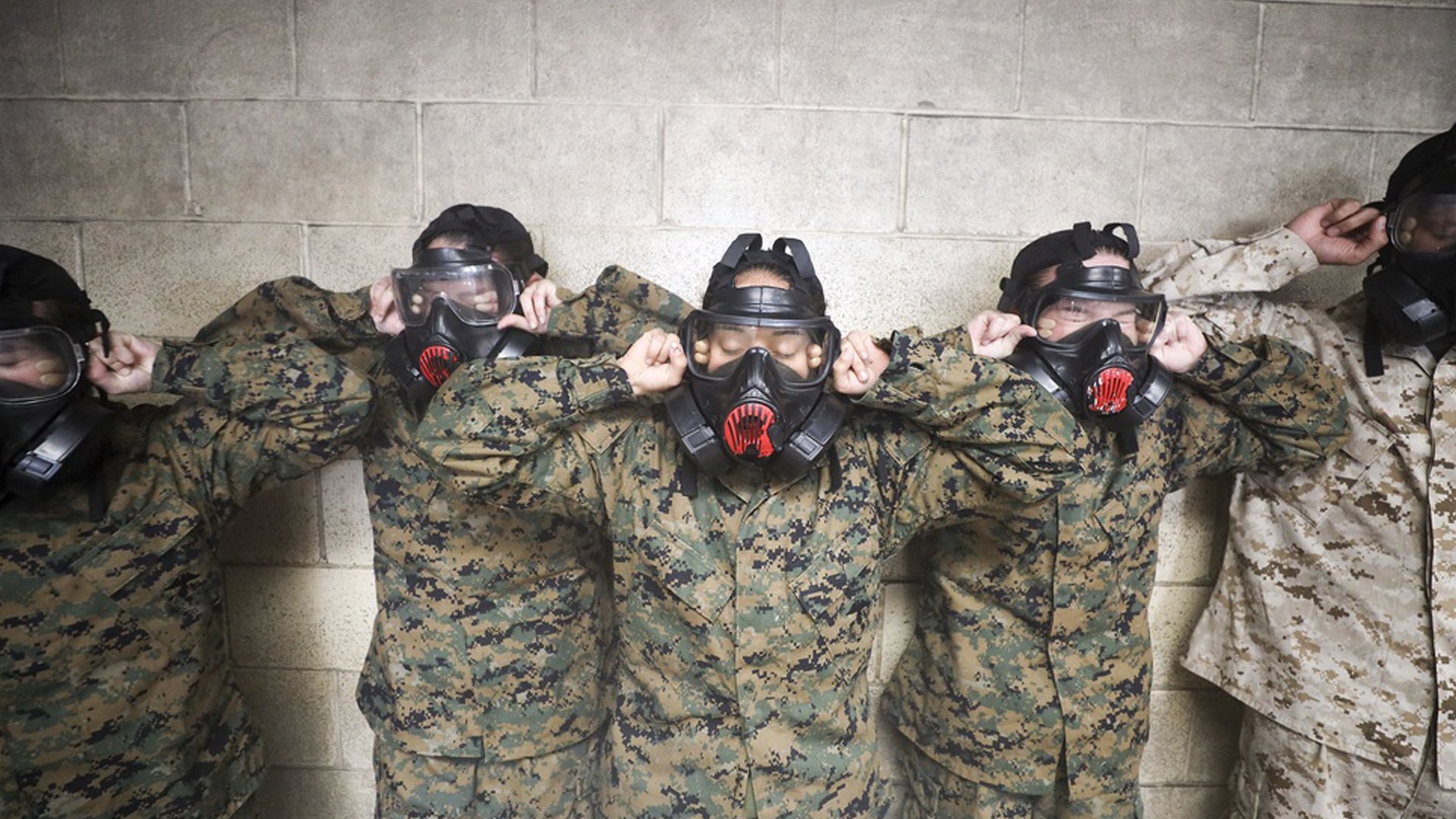
Recruits with Papa Company, 4th Recruit Training Battalion, and Fox Company, 2nd Recruit Training Battalion, complete the gas chamber during chemical, biological, radiological, and nuclear (CBRN) defense training at Marine Corps Recruit Depot Parris Island, S.C., Jan. 7, 2020. Training for CBRN defense is an event which recruits are exposed to gas agents, in order to familiarize themselves with the use of a gasmask. U.S. Marine Corps photo by Lance Cpl. Samuel Fletcher.
Getting pepper-sprayed has similar extremes. There’s certainly a difference between an instructor swiping the cone of spray across your face a few times and getting half of a can emptied directly into your eyes by a vengeful cop.
Both nonlethal weapons have proved very effective in using pain to make people comply, but let’s get down to what really matters: Is one actually worse than the other?
For Officer Gary Walsh, a Marine veteran and current police officer with the Springfield Township Police Department, the answer is a no-brainer.
“I would take the gas chamber over pepper spray any day, mostly because CS gas is the best decongestant money can buy," Walsh said. "But honestly, when you have to pepper-spray someone, you still have to go hands-on, so it ends up fucking you up too. Not to mention when you take a shower later, it will still be on you, and the water reactivates the spray, giving you a second dose. And for some reason, the gas chamber was always sort of fun because you went through it together.”
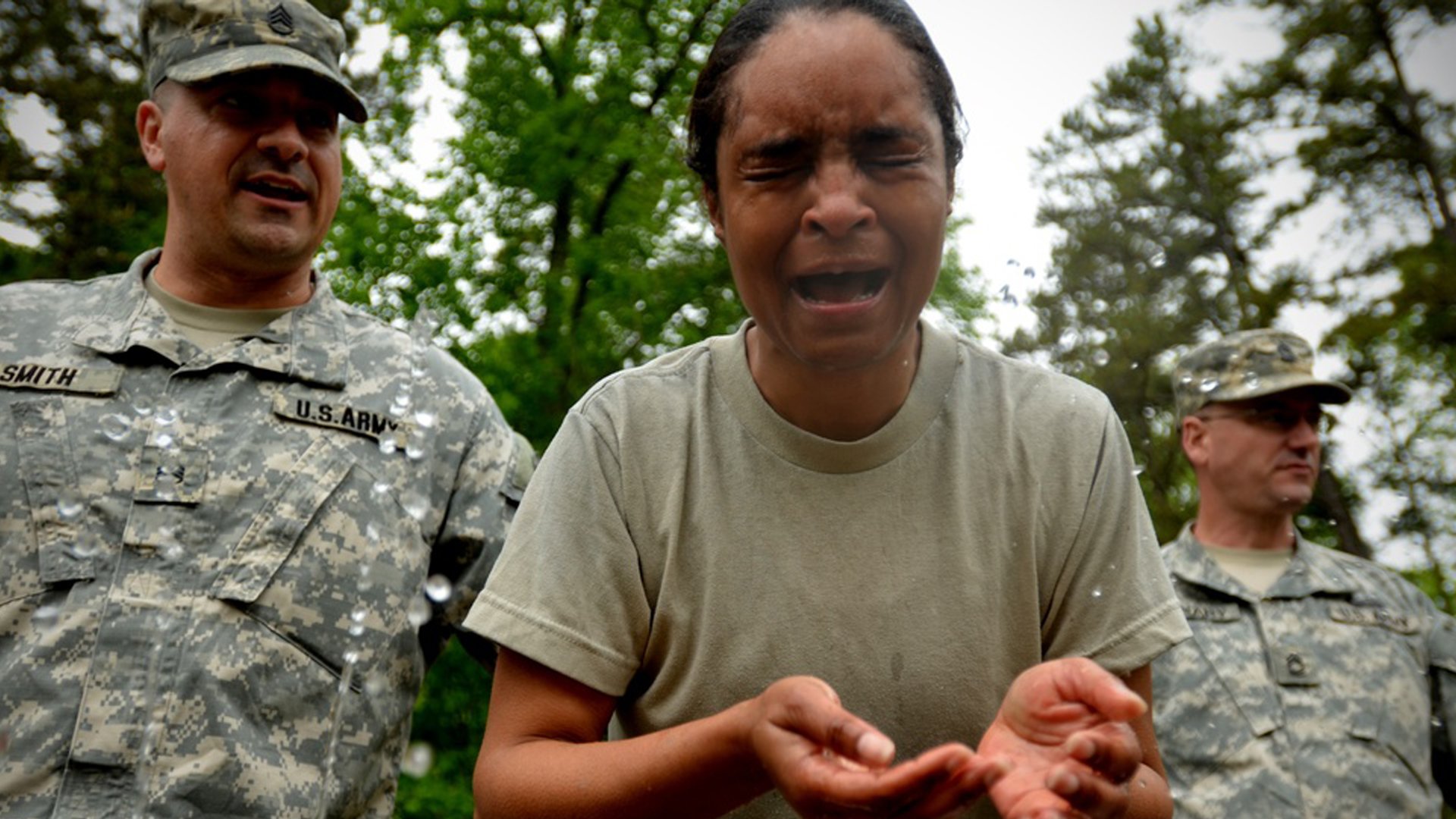
First Sgt. Anita Wyatt of HHC 105th Military Police Battalion rinses herself with water after being exposed to oleoresin capsicum during OC familiarization training at Camp Butner, a North Carolina National Guard Training site. Photo by Tech. Sgt. Brian E. Christiansen.
Newberry, whose department requires all police recruits to be exposed to both pepper spray and the gas chamber, agrees.
“Pepper spray is worse, for sure. You can’t see shit. You’re totally dependent on your friends to help you. There’s acute physical pain with pepper spray, whereas the gas chamber mostly just causes your eyes to water and your body to create a lot of snot. That’s more irritating than painful.”
Gonzales also concurs.
“Pepper spray is worse. The gas chamber has a bigger impact on your breathing, but within a minute of being out, you’re fine. Pepper spray lasts a while.”
Regardless of how rough the individual experience is, it’s pretty clear that, to those who’ve had the misfortune of experiencing the gas chamber and pepper spray, the latter is a much more painful encounter. But while one might suck a little more than the other, we highly recommend avoiding both.
Read Next: Hell on Earth: A Visual Guide to the Gas Chamber at Army Basic Training
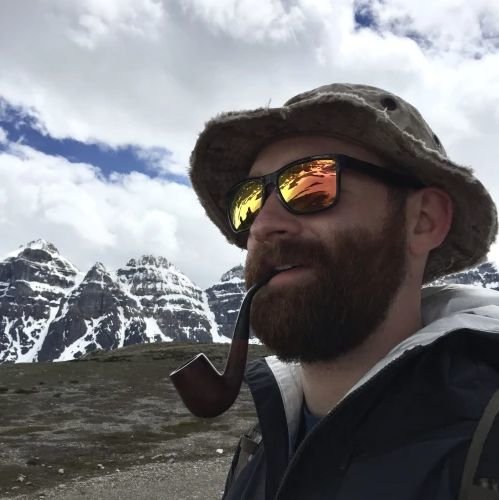
Mac Caltrider is a senior staff writer for Coffee or Die Magazine. He served in the US Marine Corps and is a former police officer. Caltrider earned his bachelor’s degree in history and now reads anything he can get his hands on. He is also the creator of Pipes & Pages, a site intended to increase readership among enlisted troops. Caltrider spends most of his time reading, writing, and waging a one-man war against premature hair loss.
BRCC and Bad Moon Print Press team up for an exclusive, limited-edition T-shirt design!
BRCC partners with Team Room Design for an exclusive T-shirt release!
Thirty Seconds Out has partnered with BRCC for an exclusive shirt design invoking the God of Winter.
Lucas O'Hara of Grizzly Forge has teamed up with BRCC for a badass, exclusive Shirt Club T-shirt design featuring his most popular knife and tiomahawk.
Coffee or Die sits down with one of the graphic designers behind Black Rifle Coffee's signature look and vibe.
Biden will award the Medal of Honor to a Vietnam War Army helicopter pilot who risked his life to save a reconnaissance team from almost certain death.
Ever wonder how much Jack Mandaville would f*ck sh*t up if he went back in time? The American Revolution didn't even see him coming.
A nearly 200-year-old West Point time capsule that at first appeared to yield little more than dust contains hidden treasure, the US Military Academy said.












